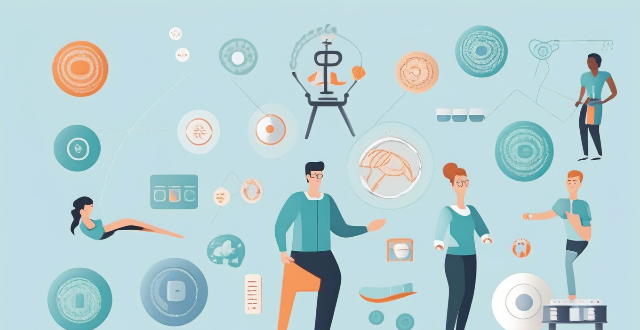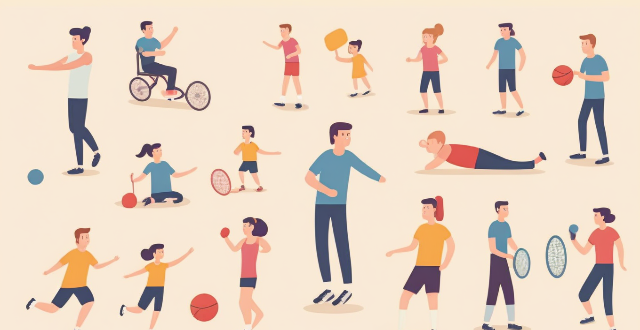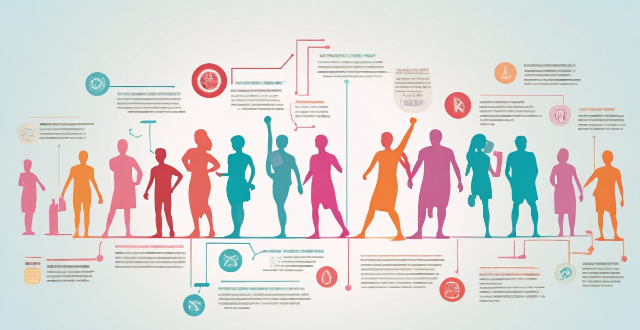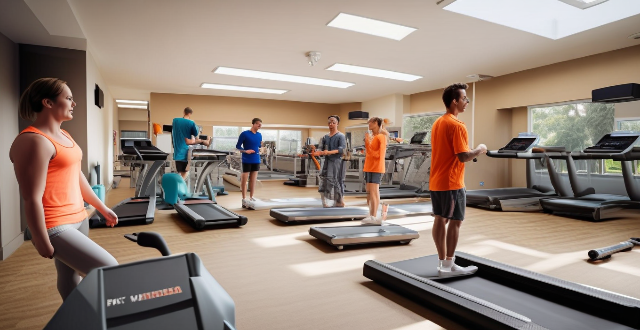Development Performance

What are the latest trends in sports research and development ?
The latest trends in sports research and development include wearable technology for real-time monitoring, data analytics for performance evaluation, genetic testing for personalized training, VR and AR for skill development, recovery technologies like cryotherapy, and nutritional advances. These advancements focus on enhancing athletic performance while emphasizing athlete health and well-being.

What are the benefits of attending a high-performance tennis training camp ?
Attending a high-performance tennis training camp can significantly improve players' skills and overall performance. These specialized programs offer a range of benefits, including technical skill enhancement, physical conditioning, mental toughness development, exposure to high-level competition, networking opportunities, personalized instruction, and off-court education. With a focus on stroke technique, footwork drills, strategy development, strength and cardiovascular training, flexibility, mental preparation, and stress management, these camps are designed to foster a competitive mindset and prepare players for the rigors of professional tennis. Additionally, the chance to play against strong opponents, receive feedback from experienced coaches, and connect with peers and potential mentors further enhances the value of these camps. Personalized training plans, goal setting workshops, and video analysis also contribute to the comprehensive nature of the training. Beyond physical and technical improvement, camps provide education on nutrition, sports psychology, and equipment knowledge, ensuring that participants are well-equipped both on and off the court. Overall, high-performance tennis training camps offer a holistic approach to tennis development, making them an invaluable resource for players looking to elevate their game.

What are the benefits of sports research and development for athletes ?
The benefits of sports research and development for athletes include optimized training programs, advanced equipment and technology, risk assessment and management, rehabilitation and recovery, mental health support, and proper nutrition and hydration. These factors contribute to improved performance, injury prevention, and overall well-being for athletes.

How can sports research and development improve athletic performance at all levels ?
Sports research and development (R&D) play a crucial role in enhancing athletic performance across various levels, from amateur to professional athletes. By employing scientific methods, technology, and data analysis, sports R&D helps athletes optimize their training, improve technique, prevent injuries, and ultimately achieve better results. Key areas of impact include biomechanics and technique optimization, training methodologies, nutrition and recovery, mental training, and injury prevention and rehabilitation. Implementation strategies involve a collaborative approach, continuous learning, individualization, and embracing technology. Sports R&D offers a multitude of avenues to enhance athletic performance, and the integration of cutting-edge science and technology will continue to drive advancements in sport, pushing the boundaries of human performance further than ever before.

What is the impact of ongoing professional development on teacher performance and student outcomes ?
The text discusses the importance of ongoing professional development (PD) for teachers in enhancing their performance and improving student outcomes. It outlines five main areas where PD has a significant impact: 1. **Enhanced Teacher Knowledge and Skills**: PD programs strengthen teachers' subject matter expertise and pedagogical approaches, leading to more informed teaching practices. 2. **Improved Teaching Practices**: PD sessions cover effective classroom management techniques and assessment strategies, helping teachers create a positive learning atmosphere and accurately evaluate student progress. 3. **Increased Job Satisfaction and Motivation**: Participating in PD activities keeps teachers engaged and motivated, reducing burnout rates and increasing job satisfaction. 4. **Positive Impact on Student Outcomes**: Well-trained teachers are more effective at delivering quality instruction, which directly translates to improved academic performance among students. 5. **Adaptability to Change**: PD helps teachers stay current with technological advancements and educational reforms, ensuring they deliver relevant content to students. In conclusion, investing in ongoing professional development for teachers is crucial for educators and has a profound impact on student success.

How can governments support the development and implementation of sustainable energy solutions ?
Governments can support sustainable energy solutions through clear policies, financial incentives, R&D, education, infrastructure development, international cooperation, market-based mechanisms, and demonstration projects.

What are the benefits of extracurricular activities for teenage development ?
This article discusses the benefits of extracurricular activities for teenage development, including improved social skills, personal growth and self-discovery, academic success, physical health and well-being, and lifelong skills and habits.

How has technology impacted sports research and development ?
Technology has significantly impacted sports research and development by introducing advanced tracking systems, virtual reality training, data analysis tools, biomechanics applications, and nutrition science advancements. These technological innovations enable athletes, coaches, and researchers to optimize performance, prevent injuries, and gain a deeper understanding of the science behind sports.

What programming languages are commonly used in educational game development ?
The text is about educational game development and the programming languages used. It lists some of the most commonly used programming languages in educational game development, including Python, JavaScript, Java, C#, UnityScript (C# variant), and HTML5/CSS3/JavaScript. The pros and cons of each language are discussed, along with examples of games that use them. The conclusion states that by choosing the right language for your project, you can ensure that your game is engaging, educational, and accessible to a wide audience.

What role does nutrition play in sports research and development ?
Nutrition is crucial for athletes' performance, recovery, and overall health. It impacts energy production, recovery and repair, hydration, and more. Researchers study the effects of ergogenic aids, supplements, and nutritional strategies to optimize sports performance. Athletes need to consume the right nutrients to fuel their bodies for peak performance.

Can sports improve academic performance in adolescents ?
Sports can positively impact academic performance in adolescents by improving physical health, mental well-being, and social skills. Studies show a positive correlation between sports participation and academic achievement, with athletes often achieving higher grades and increased college admission rates. However, individual differences and external factors must also be considered when evaluating this relationship.

How does hydration impact athletic performance and health ?
Hydration is crucial for athletic performance and health. Adequate hydration maintains energy levels, muscle function, joint lubrication, heart rate, and cognitive function during exercise. Dehydration can lead to fatigue, muscle cramping, increased heart rate, impaired cognitive abilities, and decreased physical performance. Proper hydration also aids digestion, kidney function, skin health, immune system function, and body temperature regulation. Chronic dehydration can increase the risk of kidney stones, digestive issues, weakened immune system, and other health problems. Therefore, it is essential for athletes to stay well-hydrated to achieve optimal performance levels and support their overall health.

What impact does ESG have on sustainable development goals (SDGs) ?
ESG (Environmental, Social, and Governance) is a set of criteria used by investors to screen potential investments based on their environmental, social, and governance performance. The United Nations' Sustainable Development Goals (SDGs) are a universal call to action to end poverty, protect the planet, and ensure that all people enjoy peace and prosperity. This article explores how ESG can impact achieving the SDGs in terms of reducing carbon emissions, protecting natural resources, reducing poverty, promoting gender equality, improving transparency and accountability, and ensuring access to justice. Incorporating ESG criteria into investment decisions can support projects that contribute to sustainable development and help achieve the SDGs.

What is the relationship between physical literacy and child development ?
Physical literacy is crucial for child development, enhancing cognitive, social, emotional, and physical dimensions of learning. It improves memory, attention, problem-solving skills, communication, cooperation, empathy, self-esteem, resilience, muscle strength, cardiovascular health, and reduces the risk of chronic diseases. Incorporating regular physical activity into children's daily routines promotes their overall growth and well-being.

How has wearable technology influenced the development of sports equipment ?
Wearable technology has revolutionized sports by providing athletes with innovative tools to enhance their performance and monitor their health. This includes improved performance tracking through real-time data collection and advanced analytics, enhanced safety and injury prevention through impact monitoring and recovery monitoring, personalization and customization of training programs and equipment, connectivity and social interaction through virtual training partners and social media integration. These advancements have led to better overall performance, faster improvement rates, increased safety, and a sense of community among athletes.

What inspired the development of the new product ?
The development of a new product is inspired by identifying a problem or opportunity in the market, followed by extensive research and analysis to understand market dynamics, target audience, and competition. Brainstorming sessions generate ideas for the product, which are then assessed for feasibility in terms of technology, finances, and operations. The design and development phase focuses on aesthetics, engineering, and iterative testing. A marketing strategy is crucial for success, including positioning, promotion, and pricing. Launch preparation involves supply chain management, sales channels, and customer support. Finally, post-launch activities monitor sales, collect customer feedback, and analyze market response. Each step builds upon the previous one to bring a unique solution to life that addresses specific needs or desires within a target market.

What impact does female leadership have on organizational culture and performance ?
The impact of female leadership on organizational culture and performance is significant. Women leaders prioritize collaboration, diversity, emotional intelligence, innovation, financial performance, and customer satisfaction, leading to a positive work environment and business success.

How can data analytics be used to measure teacher effectiveness and performance ?
Data analytics can be a powerful tool for measuring teacher effectiveness and performance. It allows administrators, educators, and policymakers to gain insights into various aspects of teaching and learning, leading to more informed decision-making and improvements in educational outcomes. Here's how data analytics can be leveraged to assess teacher performance: 1. Identifying Key Performance Indicators (KPIs): To begin with, it is essential to identify the key performance indicators that will be used to measure teacher effectiveness. These KPIs may include student achievement scores on standardized tests, classroom observations and evaluations, student engagement and participation levels, parent and student feedback surveys, and teacher attendance and professional development activities. 2. Collecting and Analyzing Data: Once the KPIs are established, data needs to be collected from various sources, such as student records, observation reports, and survey responses. This data should then be analyzed using statistical methods and data visualization techniques to identify patterns, trends, and correlations. 3. Interpreting Results and Making Informed Decisions: After analyzing the data, it is crucial to interpret the results and make informed decisions based on the findings. This process involves considering contextual factors, such as school resources, student demographics, and external influences, when evaluating teacher performance. 4. Continuous Monitoring and Feedback Loop: Finally, it is essential to establish a continuous monitoring system and feedback loop to ensure ongoing improvement in teacher effectiveness. This involves regularly collecting and analyzing data, providing constructive feedback to teachers, and implementing changes based on the insights gained from the data.

How do competitive sports influence social development and teamwork skills ?
Competitive sports play a significant role in shaping individuals' social development and enhancing their teamwork skills. This essay explores the various ways in which competitive sports influence these aspects of personal growth, including increased social interaction, building confidence and self-esteem, learning to deal with success and failure, collaboration, communication skills, leadership development, and responsibility and accountability. These skills are not only valuable in sports but also transferable to various aspects of life, making competitive sports an essential component of personal growth and development.

How can psychology improve an athlete's performance ?
The article discusses how psychology can improve an athlete's performance by addressing various psychological factors that can influence their mindset and behavior. The author provides a topic summary of the main points covered in the text, which includes goal setting, self-talk, stress management, confidence building, and team dynamics. Each section explains the objectives and benefits of each technique and how they can be applied to enhance an athlete's mental toughness, resilience, and winning mindset. The conclusion emphasizes the importance of incorporating psychology into an athlete's training regimen for overall well-being and enjoyment of sports.

Can playing multiple sports help in skill development ?
Participation in multiple sports can enhance overall athleticism and skill development by improving physical attributes, reducing injury risk, developing transferable skills, and promoting mental toughness. It also offers social benefits such as expanded networks and increased opportunities for exposure. While specialization has its advantages, playing multiple sports can help athletes become well-rounded competitors.

What are some emerging fields in sports research and development ?
The text discusses the emerging fields in sports research and development, highlighting five main areas: wearable technology and data analytics, virtual reality and augmented reality training, sports psychology and mental health support, nutrition science and gastrointestinal health, and biomechanics and injury prevention. Each section provides a brief overview of the field's benefits and potential impact on improving athletic performance, preventing injuries, and promoting overall well-being.

Can early specialization in a single sport hinder overall development in adolescents ?
This text discusses whether early specialization in sports can hinder the overall development of adolescents. It considers physical, psychological, and educational impacts, arguing that while early specialization may offer a path to athletic success, it can also lead to overuse injuries, psychological strain, limited social interaction, and neglect of education. The text advocates for participation in multiple sports during adolescence to promote more balanced and holistic development.

How does the globalization of sports impact player recruitment and talent development ?
The globalization of sports has led to increased competition in player recruitment, diversification of talent pools, and the adoption of advanced training methods. This includes exposure to international markets, cultural exchange, geographic broadening, demographic variety, technological integration, scientific approaches, language and communication adaptation, and education and life skills development.

Is there a correlation between sports participation and academic performance ?
The article explores the correlation between sports participation and academic performance. It highlights the potential benefits, such as improved time management skills, increased motivation and discipline, and enhanced social skills, but also acknowledges the potential drawbacks, including time constraints, fatigue, pressure, and stress. The conclusion emphasizes the importance of finding a balance between sports commitments and academic responsibilities for optimal performance in both areas.

How do international collaborations influence the development of rocket technology ?
International collaborations play a crucial role in the development of rocket technology by fostering knowledge exchange, sharing resources, and pooling expertise to overcome complex challenges. Here's a detailed look at how these partnerships influence advancements in this sector: 1. **Knowledge Exchange**: - **Cross-pollination of Ideas**: Collaborative efforts allow for the cross-pollination of ideas from different countries, each bringing unique perspectives and solutions to the table. This diversity of thought can lead to innovative breakthroughs that might not have been possible within a single nation's framework. - **Education and Training**: Through international partnerships, scientists, engineers, and technicians have access to educational programs and training opportunities that broaden their skill sets and keep them abreast of the latest advancements in rocket technology. 2. **Resource Sharing**: - **Financial Resources**: Developing advanced rocketry is costly. Partnerships can spread the financial burden across multiple nations, making ambitious projects more feasible and sustainable. - **Technical Resources**: Different countries may specialize in specific areas of rocket technology. By collaborating, they can share tools, facilities, and materials, accelerating research and development processes. 3. **Expertise Pooling**: - **Specialization**: Each country often has its areas of specialization. International collaborations enable the concentration of specialized knowledge and skills on particular aspects of rocket technology, leading to more efficient and effective outcomes. - **Problem-Solving**: When faced with complex engineering problems, a collaborative approach means that diverse teams can work together to find solutions more quickly and effectively than isolated efforts might achieve. 4. **Risk and Cost Sharing**: - **Reducing Individual Risk**: By collaborating, nations can share the risks associated with rocket development. This risk distribution makes it easier for countries to embark on ambitious projects without bearing the full consequences of potential failures. - **Cost Efficiency**: Sharing the costs of research, development, and manufacturing among partners can make rocket technology more affordable, allowing for greater investment in innovation rather than duplicative efforts. 5. **Global Standards and Regulations**: - **Unified Approach**: Collaboration helps in establishing global standards for safety, quality, and performance. These standards ensure consistency in the industry and make it easier for different countries to work together seamlessly. - **Compliance and Regulation**: International cooperation also facilitates the creation of regulations that govern the responsible use of space, preventing conflicts and ensuring the sustainable exploration and use of space for all nations. In conclusion, international collaborations are instrumental in propelling the development of rocket technology forward. They create an environment where resources, knowledge, and expertise are shared, risks and costs are distributed, and global standards are established, ultimately benefiting all participants in the quest for space exploration and beyond.

How does the research on graphene affect battery performance and lifespan ?
Graphene research has a significant impact on battery performance and lifespan by improving electrical conductivity, mechanical strength, and thermal conductivity. Increased charge carrier mobility and enhanced electrode performance lead to better power output and faster charging times. Improved cyclability and reduced shrinkage/expansion contribute to longer battery lifespan. Effective heat dissipation and enhanced safety are also benefits of graphene's high thermal conductivity. Overall, graphene is a promising material for advancing battery technology.

How has technology advancement affected the development and use of DC brushed motors in recent years ?
The advancement in technology has significantly influenced the development and use of Direct Current (DC) brushed motors over the years. This article will discuss how technological progress has affected the design, performance, and application of DC brushed motors.

What role does genetics play in determining an individual's potential for elite sports performance ?
Genetics plays a significant role in determining an individual's potential for elite sports performance. Physical attributes, physiological characteristics, and psychological traits all contribute to success in sports. Height and body build, muscle composition and fiber type, oxygen uptake and energy production, recovery and injury resistance, motivation and mental toughness, and cognitive abilities are all influenced by genetics. However, environmental factors such as training, nutrition, and coaching also play a crucial role in an athlete's development and success.

How does sports affect the physical development of adolescents ?
Sports during adolescence positively impact physical development by enhancing muscular strength, improving bone density, promoting coordination and balance, managing body composition, benefiting cardiovascular health, and fostering mental well-being. Additionally, they encourage active lifestyle habits and social interaction, setting a foundation for lifelong health and wellness.